 ★★★½
★★★½
“I’d have settled for two of three.”
This has been a long, long time coming. I’ve been a fan of Yeoh since seeing her Hong Kong starring debut, Yes, Madam, which came out all the way back in 1985. Over the years since, her career has had its ups and downs, including complete retirement after her marriage in the late eighties. She returned, and is the only actress to have appeared in two movies rated five stars here: Heroic Trio and Crouching Tiger, Hidden Dragon. But her career in Hollywood has been limited to sterling support roles, in both movies and television, encompassing everything from Bond film Tomorrow Never Dies through Star Trek: Discovery to Crazy Rich Asians. A starring role, appropriate to her talents, never seemed to come along.
Until now. Thirty-seven years after Yes, Madam, and at the age of 59, this film finally puts Yeoh where she deserves to be: front and centre. Yet, perhaps partly due to how long I’ve been waiting for this, I must confess to being a bit disappointed this is not a classic to match the titles listed above. Oh, it certainly has its moments, and Yeoh is as good as expected. However, its 139-minute running-time feels more a curse than a blessing. The concept at its core is almost infinite in scope, and I did feel the movie was trying to include all of it. Less could have been more, with a targetted approach preferable to the relentless overload adopted by the makers, which left me feeling as if I was drinking from a fire-hose.
The multiverses here literally rotate around Evelyn Wang (Yeoh), who runs a laundromat teetering on the edge of failure, with her husband, Waymond (Quan). Their marriage is also failing, her relationship with her daughter, Joy (Hsu) is on rocky ground, and she has to go to an appointment with hard-ass IRS tax auditor Deirdre Beaubeirdra (Curtis). The last is where things kick off, as she is visited by a Waymond from an alternate universe, who tells Evelyn she is the only hope of foiling the evil Jobu Tupaki. That’s an alternate Joy, who has gone insane and created a black hole-like vortex which could destroy all the multiverses. Fortunately, Evelyn’s abject failings at life give her the ability to tap into all the skills and knowledge of the other, better versions of herself.
 Like I said: almost infinite in scope. Apparently, co-writer/director Kwan was diagnosed with ADHD during the creative process: to be frank, it shows. While the imagination on view is admirable, the film bounces about between ideas at a ferocious rate, almost regardless of whether they deserve it. We spend an inordinate amount of time in a multiverse where everyone has long, floppy fingers. Yet there is also buttplug-fu, which is an example of the movie going places you’d never have expected could be so entertaining. Or a lengthy, surprisingly engrossing, scene in which two rocks in an otherwise lifeless multiverse have a conversation in captions. Because why not?
Like I said: almost infinite in scope. Apparently, co-writer/director Kwan was diagnosed with ADHD during the creative process: to be frank, it shows. While the imagination on view is admirable, the film bounces about between ideas at a ferocious rate, almost regardless of whether they deserve it. We spend an inordinate amount of time in a multiverse where everyone has long, floppy fingers. Yet there is also buttplug-fu, which is an example of the movie going places you’d never have expected could be so entertaining. Or a lengthy, surprisingly engrossing, scene in which two rocks in an otherwise lifeless multiverse have a conversation in captions. Because why not?
To the film’s credit, it never abandons its characters, and that helps keep it grounded. Albeit only just, on occasion the movie standing on its tippy-toes as it tries desperately to avoid being blown away by its own excesses. It’s perhaps telling that, despite all the film’s visual bluster, the most effective moment for me was among the simplest, one character telling another, “In another life, I would’ve been happy just doing laundry and taxes with you.” As such, Yeoh is the story’s heart, and gets to demonstrate her unquestionable acting talent. It has been fascinating to see the development of that, especially considering her lack of not just experience but any formal training. I mean, she first entered the field close to four decades ago, as a former Miss World contestant. How many of them eventually go on to get talk of an Oscar?
It’s as a result of this that I kept watching the film, because I genuinely cared what happened to Evelyn. I wanted to see her figure it all out and make peace with the various forces trying to tear her humdrum life apart. From that angle, it’s close to soap-opera, albeit an unusually effective one. Except, of course, the means by which that peace is potentially achieved, includes multiverse hopping, and fighting an evil version of your own daughter, who wields a gurgling plughole of doom. It’s the overlap between the mundane and bizarre where this finds its own voice. The problem is, it tries too hard to live up to the title. Sure, give us everything, everywhere. I’d just rather it hadn’t done so, all at once.
Yet, similarly, it leaves an awful lot of potential on the table. Why is kung-fu virtually the only talent Evelyn uses? Tap into a universe where she’s a cab driver, and give us an epic car-chase. Or the one where she’s a cat-burglar, for heist purposes. It’s not hard to come up with a dozen such threads. Perhaps the makers were constrained by their budget, a relatively cheap $25 million – less than Crazy Rich Asians. They do an admirable job of squeezing value out of it; again, the sheer pace probably helps, with your brain trying so desperately to keep up, it’s hard-pushed to pay attention to any of the finer details.
But I’m glad I won’t go to my grave with my final paid cinematic experience being Terminator: Dark Fate. [Though the two Neanderthals beside us, talking loudly and checking their phones throughout, really make me think we are done with theatres] The Daniels deserve credit for the obvious invention displayed, and this is the kind of original property I’m happy to support, over another sequel and/or shitty comic adaptation. I also must mention the supporting cast, who are uniformly great, particularly Hsu as both aggravated daughter and multiiverse threatening villainess [There’s also a cameo by another eighties Hong Kong action actress, Michiko Nishiwaki. Maybe she’ll get her own movie next?]. That it stars one of the most under-rated actresses in Hollywood, finally getting the opportunity she deserves, is alone reason enough to see this. Just don’t expect too much.
Dir: Dan Kwan, Daniel Scheinert
Star: Michelle Yeoh, Stephanie Hsu, Ke Huy Quan, Jamie Lee Curtis
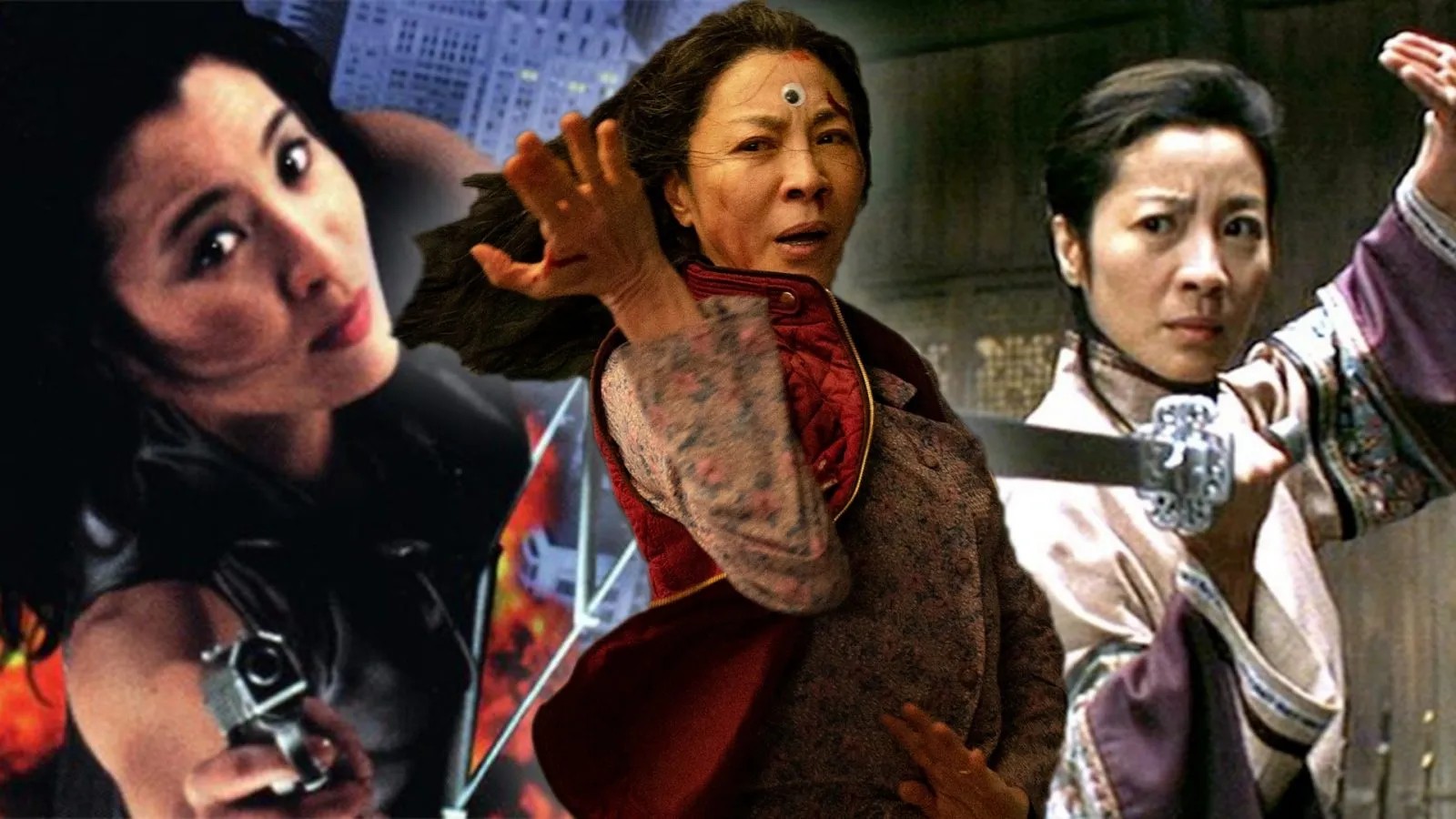
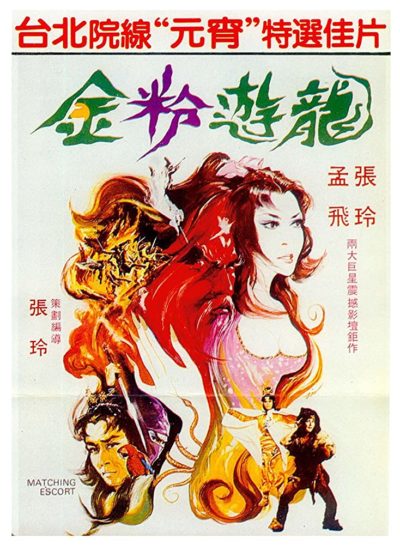 I was pleasantly surprised when this random kung-fu film found Tubi (under the Silver Fox title) turned out to be by the creator of Wolf Devil Woman. which was batshit crazy, but at least quite entertaining. This is, unfortunately, only half of that – and worse, it’s the insanity which is delivered, with the entertainment being only sporadic in nature. I will say, in the film’s defense, the presentation is likely not helping. There’s no subbed version I’ve been able to find, and the English language one is badly dubbed, cropped visually and is likely also cut (either that, or the editing is worse than terrible).
I was pleasantly surprised when this random kung-fu film found Tubi (under the Silver Fox title) turned out to be by the creator of Wolf Devil Woman. which was batshit crazy, but at least quite entertaining. This is, unfortunately, only half of that – and worse, it’s the insanity which is delivered, with the entertainment being only sporadic in nature. I will say, in the film’s defense, the presentation is likely not helping. There’s no subbed version I’ve been able to find, and the English language one is badly dubbed, cropped visually and is likely also cut (either that, or the editing is worse than terrible).




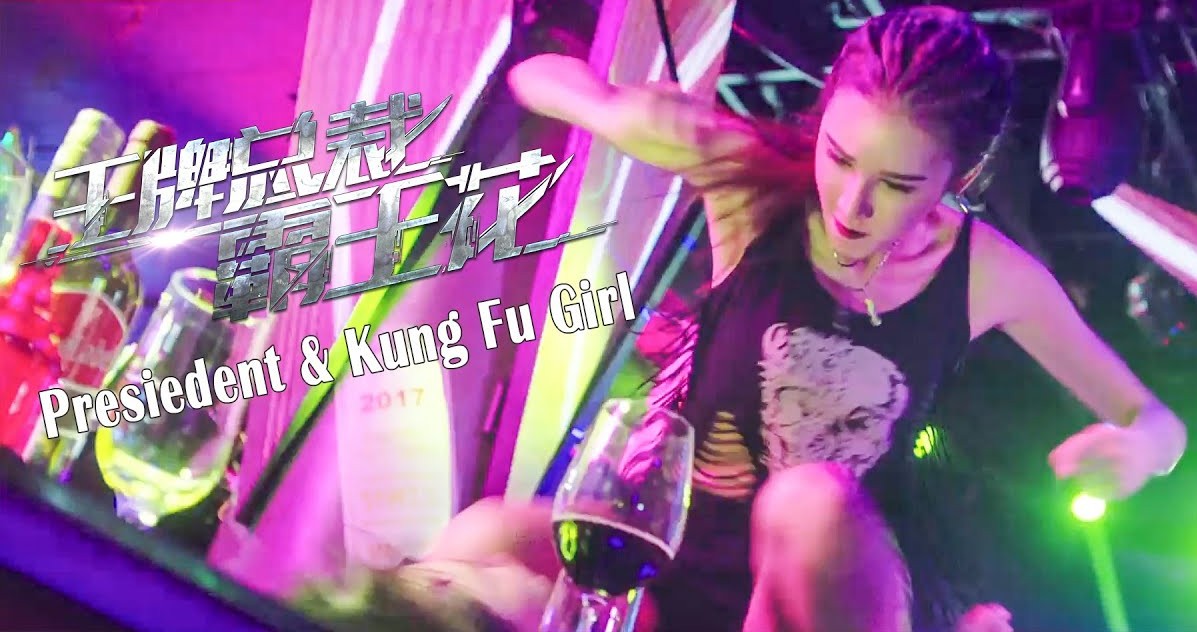 ★★½
★★½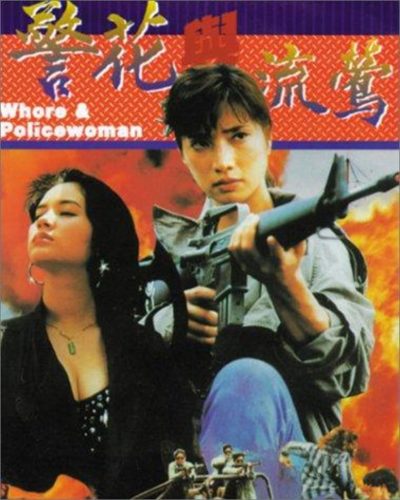 If the title is more than a bit blunt, it’s certainly accurate. May Lin (Cheng) is a brash hooker, who runs a sideline in blackmail videos with her flatmate, Nana. But one night she comes home to find Nana near death, the victim of a brutal client. She tells the police about the video, but before she can give it to them, the perpetrator – rich and influential politician, Kao Tien Chin (Cho) – sends an army of beige trenchcoat wearing killers to take care of both Nana and May. The former succumbs, but the latter escapes and goes on the run. With the police force apparently leaking like a sieve and the case being shut down from on high, prosecutor Yin Li Shan sends his niece, Nancy Cheng (Mishiwaki), to link up with May and bring her in. But they’ll have to get past the trenchcoat mafia, among other threats, for there to be any hope of justice.
If the title is more than a bit blunt, it’s certainly accurate. May Lin (Cheng) is a brash hooker, who runs a sideline in blackmail videos with her flatmate, Nana. But one night she comes home to find Nana near death, the victim of a brutal client. She tells the police about the video, but before she can give it to them, the perpetrator – rich and influential politician, Kao Tien Chin (Cho) – sends an army of beige trenchcoat wearing killers to take care of both Nana and May. The former succumbs, but the latter escapes and goes on the run. With the police force apparently leaking like a sieve and the case being shut down from on high, prosecutor Yin Li Shan sends his niece, Nancy Cheng (Mishiwaki), to link up with May and bring her in. But they’ll have to get past the trenchcoat mafia, among other threats, for there to be any hope of justice.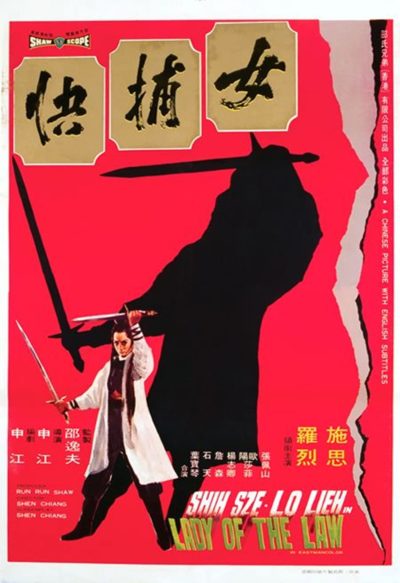 I kept moving between 2½ and 3 stars for this. It is pretty chatty, and the focus is not as much on the title character as I might have hoped. But there’s no denying that Leng (Shi) is a very solid character, and when she gets her chances to shine, does so in a memorable fashion. This is nowhere better illustrated than her final battle, where she takes on an enemy – who just tried to molest Leng, believing her drugged – while they both balance on a tight-rope. There’s no particular reason for the fight to take place in such an environment. The ground would have been perfectly fine. But it adds an extra dimension, and the way it’s filmed makes it feel surprisingly possible that they were wobbling about up there.
I kept moving between 2½ and 3 stars for this. It is pretty chatty, and the focus is not as much on the title character as I might have hoped. But there’s no denying that Leng (Shi) is a very solid character, and when she gets her chances to shine, does so in a memorable fashion. This is nowhere better illustrated than her final battle, where she takes on an enemy – who just tried to molest Leng, believing her drugged – while they both balance on a tight-rope. There’s no particular reason for the fight to take place in such an environment. The ground would have been perfectly fine. But it adds an extra dimension, and the way it’s filmed makes it feel surprisingly possible that they were wobbling about up there.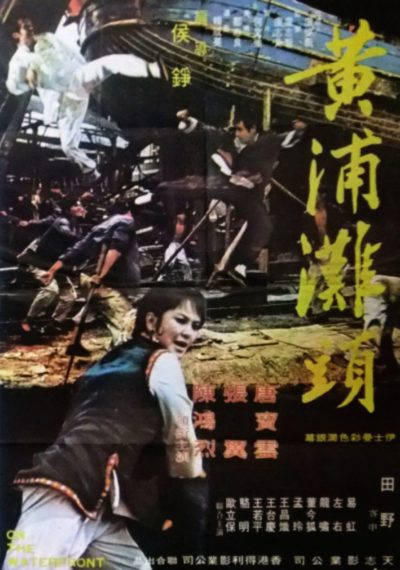 Yeah, I think if I’d seen this under the alternate title of On the Waterfront, I might well have passed it by. Though that is probably a slightly more accurate description of the contents here, even allowing for the complete absence of Marlon Brando. [At least we didn’t have to deal with the expectations set by the Italian title, which translates as “The merciless hand of Bruce Lee strikes again”!] It takes place around the Whampoa wharves in Shanghai, where various crime families are jostling for position and control, with varying degrees of morality e.g. whether or not they approve of drugs and/or sex trafficking as a means to make money. Particularly of note here are Red Rose (Tang) and Zhou (Chang), who eventually end up allies against their common enemy (Chen).
Yeah, I think if I’d seen this under the alternate title of On the Waterfront, I might well have passed it by. Though that is probably a slightly more accurate description of the contents here, even allowing for the complete absence of Marlon Brando. [At least we didn’t have to deal with the expectations set by the Italian title, which translates as “The merciless hand of Bruce Lee strikes again”!] It takes place around the Whampoa wharves in Shanghai, where various crime families are jostling for position and control, with varying degrees of morality e.g. whether or not they approve of drugs and/or sex trafficking as a means to make money. Particularly of note here are Red Rose (Tang) and Zhou (Chang), who eventually end up allies against their common enemy (Chen). ★★★★
★★★★ Well, this was a surprise. I was not expecting too much, this being a movie released straight to Hulu or Disney+ (depending on your territory), and starring someone best known for rom-com franchise, The Kissing Booth. Actually, scratch the “too” from that sentence. I went in on the basis that I was contractually obliged to watch it, as the guy running this site. I say this, so you’ll understand how unexpected it is to be writing this: it’s the best action-heroine film of the year so far. This is just thoroughly entertaining, and as the tag-line above suggests, is as close as I’ve ever seen to a genuine, female version of the greatest action movie of all-time.
Well, this was a surprise. I was not expecting too much, this being a movie released straight to Hulu or Disney+ (depending on your territory), and starring someone best known for rom-com franchise, The Kissing Booth. Actually, scratch the “too” from that sentence. I went in on the basis that I was contractually obliged to watch it, as the guy running this site. I say this, so you’ll understand how unexpected it is to be writing this: it’s the best action-heroine film of the year so far. This is just thoroughly entertaining, and as the tag-line above suggests, is as close as I’ve ever seen to a genuine, female version of the greatest action movie of all-time.  This reaches its height in a glorious, extended sequence, with the Princess battling her way down the tower’s staircase. It feels as if it’s 20 minutes long, such is the energy contained in it. There’s even a beautiful moment of tension releasing humour, part of a running gag involving one of Julian’s minions who is too fat for all the stairs he’s ordered to climb. Nothing thereafter, including the inevitable fight against her wannabe husband, quite reaches the same heights. Glover is good value as Julian, staying just this side of a pantomime villain. As Die Hard shows, having a memorable antagonist is an important element. He’s not quite Alan Rickman – though who is? And I do have to question some of Julian’s decisions.
This reaches its height in a glorious, extended sequence, with the Princess battling her way down the tower’s staircase. It feels as if it’s 20 minutes long, such is the energy contained in it. There’s even a beautiful moment of tension releasing humour, part of a running gag involving one of Julian’s minions who is too fat for all the stairs he’s ordered to climb. Nothing thereafter, including the inevitable fight against her wannabe husband, quite reaches the same heights. Glover is good value as Julian, staying just this side of a pantomime villain. As Die Hard shows, having a memorable antagonist is an important element. He’s not quite Alan Rickman – though who is? And I do have to question some of Julian’s decisions. 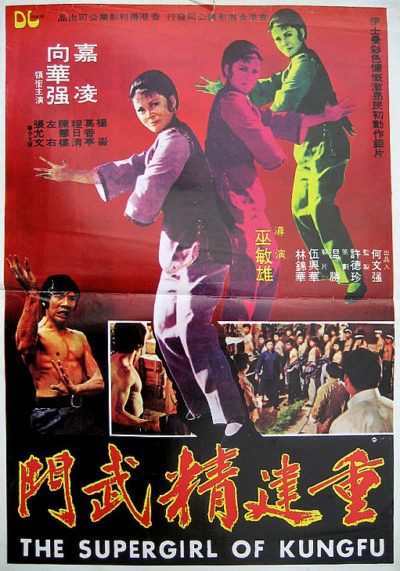 This is another one of an apparently infinite series of kung-fu films, set during the Japanese occupation of China that took place just before World War II. The heroine is Little Flower (Lee), who gets given a death-bed mission by her martial arts master father: return to Shanghai, and lead his students at the Ching Wu Men school against the occupying Japanese forces. Except, on arriving, Flower finds the school disbanded by force, and its disciples scattered to the winds. She begins to hunt the top students, Rock (Yang) and Mercury – the latter has gone particularly deep into hiding after having killed twenty Japanese soldiers in one night. But Flower’s own activities, protecting the poor, bring her to the attention of the Japanese authorities, because they think she’s part of the rebels, as well as a local Chinese cop (Heung).
This is another one of an apparently infinite series of kung-fu films, set during the Japanese occupation of China that took place just before World War II. The heroine is Little Flower (Lee), who gets given a death-bed mission by her martial arts master father: return to Shanghai, and lead his students at the Ching Wu Men school against the occupying Japanese forces. Except, on arriving, Flower finds the school disbanded by force, and its disciples scattered to the winds. She begins to hunt the top students, Rock (Yang) and Mercury – the latter has gone particularly deep into hiding after having killed twenty Japanese soldiers in one night. But Flower’s own activities, protecting the poor, bring her to the attention of the Japanese authorities, because they think she’s part of the rebels, as well as a local Chinese cop (Heung).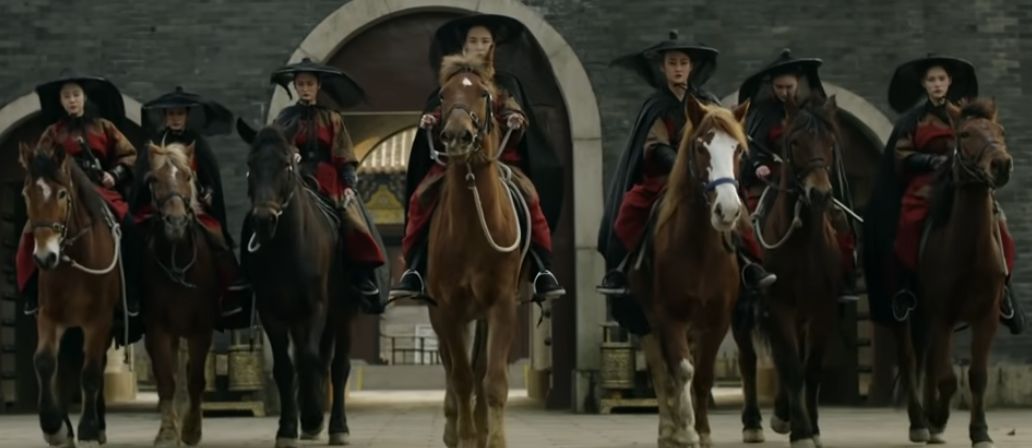 This takes place in early 15th century China, when Zhu Di (Zhang) had taken over the throne from his nephew, Wen Du (also played by Zhang), forcing the latter to go into hiding. Zhu is protected by his all-female Imperial Guard, under the leadership of Qing Lian (Xu). Actually, all seven of them have the surname Qing, which confused the heck out of me at first. But it actually makes sense, as they were taken in as babies, and brought up for the express purpose of protecting Zhu Di. Anyway, he gets word that Wen is to be found in a house of ill-repute, and send the Qings after him. Lian is injured in the raid, but her life is saved by Li Gexiao. When she returns to Zhu, however, he’s having none of it and orders her to kill Li, knowing he is actually the dethroned Emperor Wen. Lian opts not to carry out the emperor’s orders, and so the remaining Imperial Guard sisters are sent out by Zhu, to make her pay for her disloyalty.
This takes place in early 15th century China, when Zhu Di (Zhang) had taken over the throne from his nephew, Wen Du (also played by Zhang), forcing the latter to go into hiding. Zhu is protected by his all-female Imperial Guard, under the leadership of Qing Lian (Xu). Actually, all seven of them have the surname Qing, which confused the heck out of me at first. But it actually makes sense, as they were taken in as babies, and brought up for the express purpose of protecting Zhu Di. Anyway, he gets word that Wen is to be found in a house of ill-repute, and send the Qings after him. Lian is injured in the raid, but her life is saved by Li Gexiao. When she returns to Zhu, however, he’s having none of it and orders her to kill Li, knowing he is actually the dethroned Emperor Wen. Lian opts not to carry out the emperor’s orders, and so the remaining Imperial Guard sisters are sent out by Zhu, to make her pay for her disloyalty. ★★★½
★★★½ Like I said: almost infinite in scope. Apparently, co-writer/director Kwan was diagnosed with ADHD during the creative process: to be frank, it shows. While the imagination on view is admirable, the film bounces about between ideas at a ferocious rate, almost regardless of whether they deserve it. We spend an inordinate amount of time in a multiverse where everyone has long, floppy fingers. Yet there is also buttplug-fu, which is an example of the movie going places you’d never have expected could be so entertaining. Or a lengthy, surprisingly engrossing, scene in which two rocks in an otherwise lifeless multiverse have a conversation in captions. Because why not?
Like I said: almost infinite in scope. Apparently, co-writer/director Kwan was diagnosed with ADHD during the creative process: to be frank, it shows. While the imagination on view is admirable, the film bounces about between ideas at a ferocious rate, almost regardless of whether they deserve it. We spend an inordinate amount of time in a multiverse where everyone has long, floppy fingers. Yet there is also buttplug-fu, which is an example of the movie going places you’d never have expected could be so entertaining. Or a lengthy, surprisingly engrossing, scene in which two rocks in an otherwise lifeless multiverse have a conversation in captions. Because why not?
 The first thing which will hit you about this 1979 Taiwanese co-production is the utterly shameless way it hijacks John Williams’s soundtrack to Star Wars. 93 minutes later, as the end credits roll, accompanied by more unauthorized liftage… That’s probably still going to be the main element of this you will remember. For the rest is largely a confusingly-plotted and not very well executed bit of chop socky. Despite Angela Mao’s presence, second on the list of participants, she is a long way behind the main character, in terms of both screen time and action.
The first thing which will hit you about this 1979 Taiwanese co-production is the utterly shameless way it hijacks John Williams’s soundtrack to Star Wars. 93 minutes later, as the end credits roll, accompanied by more unauthorized liftage… That’s probably still going to be the main element of this you will remember. For the rest is largely a confusingly-plotted and not very well executed bit of chop socky. Despite Angela Mao’s presence, second on the list of participants, she is a long way behind the main character, in terms of both screen time and action.